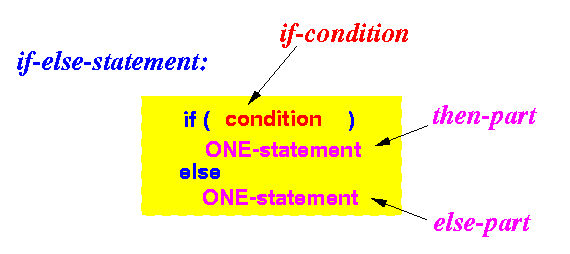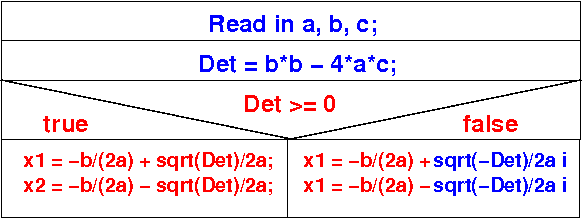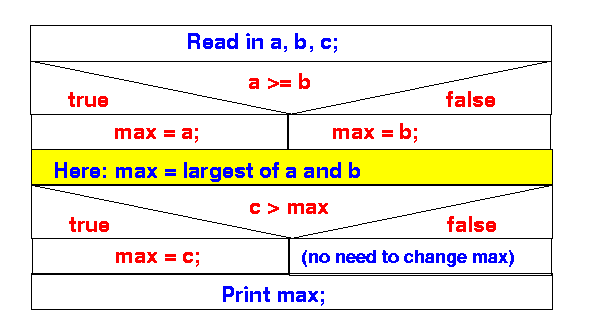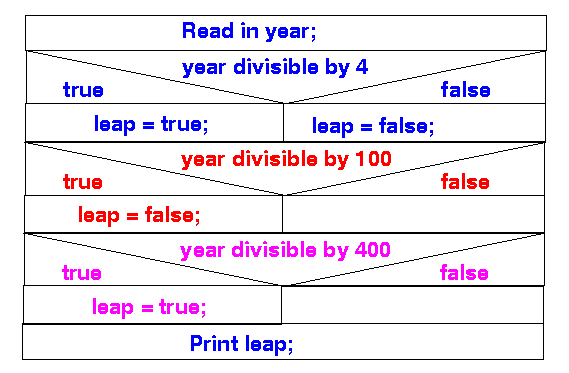- Programming problem:
- Re-write the a,b,c-formula program to solve for complex number solutions when b2 - 4ac < 0
- Algorithm:
input a, b, c; Det = b*b - 4*a*c; // Compute the determinant if ( Det >= 0 ) { print -b/(2a) + sqrt(Det)/(2a); // Real number solutions print -b/(2a) - sqrt(Det)/(2a); } if ( Det < 0 ) { print -b/(2a) "+" (sqrt(-Det)/(2a) + "i"); // Complex number solutions print -b/(2a) "-" (sqrt(-Det)/(2a) + "i"); }
- Java program:
import java.util.Scanner; public class Abc3 { public static void main(String[] args) { double a, b, c, Det, re, im; Scanner in = new Scanner(System.in); // Construct Scanner object a = in.nextDouble(); // Read in next number into a b = in.nextDouble(); // Read in next number into b c = in.nextDouble(); // Read in next number into c Det = b*b - 4*a*c; if ( Det >= 0 ) { System.out.println( (-b + Math.sqrt( Det ) ) / (2*a) ); System.out.println( (-b - Math.sqrt( Det ) ) / (2*a) ); } if ( Det < 0 ) { re = -b/(2*a); // Compute real part im = Math.sqrt( -Det )/(2*a); // Compute imaginary part System.out.println( re + "+" + im + "i" ); System.out.println( re + "-" + im + "i" ); } } }
- Example Program:
(Demo above code)

- Prog file: click here
How to run the program:
- Right click on link and
save in a scratch directory
- To compile: javac Abc3.java
- To run: java Abc3
Example:
Enter a:1 Enter b:2 Enter c:5 -1.0+2.0i -1.0-2.0i
Shortcoming:
- We have to negate
the if-condition ourselves...
- This can introduce unnecessary errors
- Solution:
- Extend the if-statement
with an
alternative statement
- The alternative statement is only executed when the if-condition is false
- Extend the if-statement
with an
alternative statement
- The if-else statement:
- The if-else statement is
the second conditional statement
in Java
- The if-else statement
selects
one of the two possible statements
to be executed based
on a given
condition
Example:
if ( condition is true ) then execute this statement; otherwise execute the other statement;
- The if-else statement is
the second conditional statement
in Java
- Syntax of the if-else-statement:
if ( CONDITION ) ONE-statement else ONE-statementExplanation:
- The keyword if
announces (to the Java compiler) that
we started an if-else-statement
- A conditional clause
( CONDITION
)
follows the
keyword if
- This is the condition of the if-else-statement
- Following the condition clause,
you can write (only)
one statement
- This statement will only be executed if the condition is true
- Following the then-part,
you must specify
the keyword
else followed
by (only)
one statement
- This statement will only be executed if the condition is false
Note:
- The way that the Java compiler decide
whether a conditional statement is:
- An if-statement
- An if-else-statement
is by the presence/absence of the keyword else.
- The keyword if
announces (to the Java compiler) that
we started an if-else-statement
- The statement following
the keyword else
in an if-else-statement is called
- The else-part of
the if-else-statement
(Or else-part for short)
Schematically:

- The else-part of
the if-else-statement
- Programming problem:
- Re-write the a,b,c-formula program to solve for complex number solutions when b2 - 4ac < 0
- Algorithm:

- Java program:
import java.util.Scanner; public class Abc4 { public static void main(String[] args) { double a, b, c, Det, re, im; Scanner in = new Scanner(System.in); // Construct Scanner object a = in.nextDouble(); // Read in next number into a b = in.nextDouble(); // Read in next number into b c = in.nextDouble(); // Read in next number into c Det = b*b - 4*a*c; if ( Det >= 0 ) { System.out.println( (-b + Math.sqrt( Det ) ) / (2*a) ); System.out.println( (-b - Math.sqrt( Det ) ) / (2*a) ); } else { re = -b/(2*a); // Compute real part im = Math.sqrt( -Det )/(2*a); // Compute imaginary part System.out.println( re + "+" + im + "i" ); System.out.println( re + "-" + im + "i" ); } } }
- Example Program:
(Demo above code)

- Prog file: click here
How to run the program:
- Right click on link and
save in a scratch directory
- To compile: javac Abc4.java
- To run: java Abc4
- Programming problem:
- Read in 2 number
a and
b
- Assign to the variable max the largest value of a and b
- Read in 2 number
a and
b
- Algorithm:

- Java program:
import java.util.Scanner; public class Max01 { public static void main(String[] args) { double a, b, max; Scanner in = new Scanner(System.in); // Construct Scanner object a = in.nextDouble(); // Read in next number into a b = in.nextDouble(); // Read in next number into b if ( a >= b ) max = a; else max = b; System.out.println( "max value = " + max ); } }
- Example Program:
(Demo above code)

- Prog file: click here
How to run the program:
- Right click on link and
save in a scratch directory
- To compile: javac Max01.java
- To run: java Max01
- Programming problem:
- Read in 3 number
a,
b and
c
- Assign to the variable max the largest value of a, b and c
- Read in 3 number
a,
b and
c
- Algorithm:

- Java program:
import java.util.Scanner; public class Max01 { public static void main(String[] args) { double a, b, max; Scanner in = new Scanner(System.in); // Construct Scanner object a = in.nextDouble(); // Read in next number into a b = in.nextDouble(); // Read in next number into b c = in.nextDouble(); // Read in next number into c if ( a >= b ) // Find max(a,b) max = a; else max = b; if ( c > max ) // Check c > max ? max = c; System.out.println( "max value = " + max ); } }
- Example Program:
(Demo above code)

- Prog file: click here
How to run the program:
- Right click on link and
save in a scratch directory
- To compile: javac Max02.java
- To run: java Max02
- Leap year description (Wikipedia):
- In the Gregorian calendar, the current standard calendar
in most of the world, most years that
are evenly divisible by 4 are leap years.
- Years that are evenly divisible by 100 are not leap years, unless they are also evenly divisible by 400, in which case they are leap years
- In the Gregorian calendar, the current standard calendar
in most of the world, most years that
are evenly divisible by 4 are leap years.
- Examples:
Year Leap year ? Reason ---------- --------------- ================= 1904 Yes Divisible by 4 1900 No Divisible by 100 2000 Yes Divisible by 400
- Algorithm:

- Program in Java:
import java.util.Scanner; public class LeapYear01 { public static void main(String[] args) { int year; boolean leap; Scanner in = new Scanner(System.in); // Construct Scanner object year = in.nextInt(); // Read in year if ( year % 4 == 0 ) leap = true; else leap = false; if ( year % 100 == 0 ) leap = false; if ( year % 400 == 0 ) leap = true; System.out.println("Year is leap year ? " + leap); } }
- Example Program:
(Demo above code)

- Prog file: click here
How to run the program:
- Right click on link and
save in a scratch directory
- To compile: javac LeapYear01.java
- To run: java LeapYear01
- Common error 1:
bogus semicolon
after the if-condition
Example:
if ( a >= b ) ; // Bogus ; max = a; else max = b;Compiler message:
Error01.java:18: 'else' without 'if' else ^
because the compiler "reads" the program as follows:
if ( a >= b ) // A correct if-statement ; // Note: the if-statement ended here ! max = a; // A correct assignment statement else // else ? Where is the if ??? max = b;
- Common error 2:
forgetting to use statement block
in the then-part
Example:
if ( Det >= 0 ) System.out.println( (-b + Math.sqrt( Det ) ) / (2*a) ); System.out.println( (-b - Math.sqrt( Det ) ) / (2*a) ); else re = -b/(2*a); // Compute real part im = Math.sqrt( -Det )/(2*a); // Compute imaginary part System.out.println( re + "+" + im + "i" ); System.out.println( re + "-" + im + "i" );The Java compiler will report the error 'else' without 'if' because syntactically, the program is read as follows:
if ( Det >= 0 ) System.out.println( (-b + Math.sqrt( Det ) ) / (2*a) ); // If-statement System.out.println( (-b - Math.sqrt( Det ) ) / (2*a) ); // Print else // Else without if re = -b/(2*a); // Compute real part im = Math.sqrt( -Det )/(2*a); // Compute imaginary part System.out.println( re + "+" + im + "i" ); System.out.println( re + "-" + im + "i" );
- Common error 3:
missing semicolon
after the then-part
Example:
if ( a >= b ) max = a // Missing semicolon !!! else max = b;Compiler message:
Error03.java:17: ';' expected max = a ^Reason:
- The then-part is
ONE statement
- A statement must be ended with a semicolon
- The then-part is
ONE statement
- Common error 4:
bogus semicolon
after the block in the then-part
Example:
if ( a >= b ) { max = a; }; // bogus semicolon !!! else { max = b; }Compiler message:
Error04.java:20: 'else' without 'if' else ^Because syntactically, the program is read as follows:
if ( a >= b ) // An if-statement { max = a; } ; // An empty statement !!! else // Else without if... { max = b; }
- As you can see,
forgetting a ";" and
adding an extra ";"
can cause
serious syntax errors
The best thing is to stick to one useful form: use block !!!
- I always
write if-statements and
if-else-statements using
blocks first:
if ( ..... ) { (leave empty first) }
if ( ..... ) { (leave empty first) } else { (leave empty first) }I fill in the statements in the then-part and else-part later.
So even when the if-part and/or else-part consist of 1 statement, I write them as blocks.